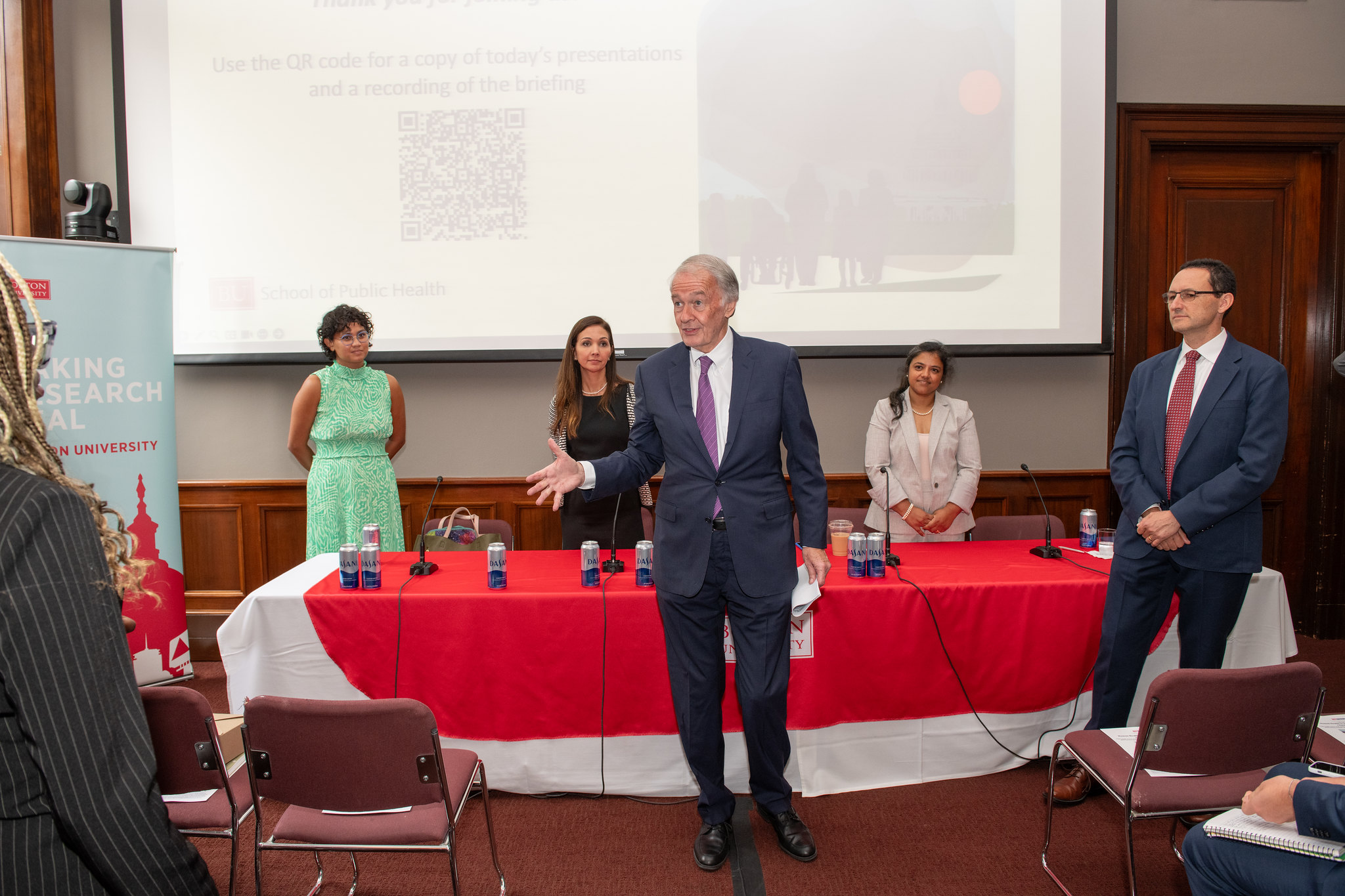Faculty Hold Congressional Briefing to Warn of Health Effects from Climate Change.

Massachusetts Sen. Edward Markey gave brief closing remarks at the late July event. Photo: David Scavone | Scavone Photography
Faculty Hold Congressional Briefing to Warn of Health Effects from Climate Change
School of Public Health faculty and their colleagues recently delivered a sobering briefing on Capitol Hill to remind congressional staffers of the simple message that climate change is real, is caused by human actions, and affects all of us.
Gregory Wellenius, director of the SPH Center for Climate and Health, opened with an overview of the myriad ways climate change affects our environment and explained the related adverse health consequences. While climate change is an environmental problem, Wellenius and his colleagues reminded the audience that it is also a public health problem.
Severe weather events may grab headlines, Wellenius said, but “we have to live in these extreme temperatures, live with more air pollution, live with increased vector-borne diseases. And this leads to these health impacts that we see—people dying, people being displaced because the places they live are no longer as livable as they were 30, 50, or 100 years ago.”
Wellenius, a professor of environmental health at SPH, is also one of the co-leaders of an innovative venture with Harvard-Chan School of Public Health that aims to support research into the health effects of climate change.
Amruta Nori-Sarma, assistant professor of environmental health at SPH, is also a co-lead and briefed the congressional staffers on the organizational structure of the new BUSPH-Harvard Chan School Climate Change and Health Research Coordinating Center.
Named the BUSPH-Harvard Chan School CAFÉ, the CAFÉ will Convene, Accelerate, Foster, and Expand a global network of emerging and established researchers from a variety of sectors who are studying issues relevant to the multi-layered consequences of climate change on human health and the environment.
The first-of-its-kind center is also co-led by Francesca Dominici, professor of biostatistics at the Harvard Chan School and co-director of the Data Science Initiative at Harvard University. The venture is funded by a $6.7 million, three-year grant from the National Institute of Environmental Health Sciences (NIEHS), which is part of the National Institutes of Health (NIH).
Nori-Sarma outlined how CAFÉ’s four major functions are essential to the group’s overall quest to accelerate the translation of research into practical solutions.
“We understand the ways in which climate is impacting our environment,” Nori-Sarma said, describing the data coordination function of the center. “We’re trying to develop best practices for connecting those different data resources around environmental fluctuation changes with everybody who is interested in joining this field.”
The team hopes to act as a conduit between climate-and-health researchers and the growing body of accessible data that the center can deliver. Another early goal is to increase the number of new researchers working in the field, many of whom may already work in areas relevant to climate and health. As part of the center’s capacity building function, team members plan to identify existing low-cost resources available to train different professionals and researchers in climate health. Where such resources aren’t currently available, Nori-Sarma said, “We’re going to be doing things such as administering pilot grants for people who are interested in getting their research up and running, or who are interested in bringing additional stakeholders into their work.”
As climate change is a global problem, albeit one with increasingly local effects, the center and its network of researchers are intended to be a global community. “We’re not only focused on bringing in folks from the U.S., we would like to pair them up with people from the Global South who are interested in doing research as well, identifying some of the globally vulnerable populations around climate health,” Nori-Sarma explained.
Dr. Leticia Nogueira, scientific director at the American Cancer Society, described the health effects of climate change on cancer patients, who are among the medically vulnerable populations disproportionately affected by severe weather events, poor air quality, and elevated heat.
“Cancer diagnosis and treatment also have socioeconomic consequences and these make it harder for people to prepare and respond to disaster because it affects their ability to evacuate, to stockpile food, to improve their house infrastructure, or install air filters during wildfires,” Nogueira said.
Marissa Zampino, a community organizer at the Mystic River Watershed Association, offered her perspective as someone working on extreme heat intervention in multiple environmental justice communities in Massachusetts. In her experience, having strong community networks is one of the most important determinants of whether vulnerable people within that community will be able to survive a heat wave.
Building equitable resilience with the right kinds of adaptable infrastructure might be a potential solution for some of the communities along the river, Zampino said. “We can provide cool, amazing, and fun places for people to be—also places where people can build community and meet their neighbors,” Zampino said. “So imagine amazing parks and cooling centers with kids’ activities and staff. Imagine parks with water features and places for people to sit and enjoy. And overall, just think of places where people can be cool and connect with their neighbors.”